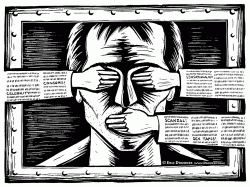All of this week’s WNR, and most of this week’s news stories, were written on my new Surface Pro 3. It’s proving to be more than an adequate desktop and laptop replacement (with the tablet mode the least used of the three available modes, for me). All of the teething problems have more to do with the switch to Windows 8.1 (coming from Windows 7), than the actual SP3 hardware. And with the SSD (vs RAID 1 HDDs), faster CPU (i7-4650U vs Core 2 Duo E8600) and more RAM (8GB vs 4GB), it’s also a lot faster too (not to mention super quiet). I’ll keep you all update if I run into any serious issues with the transition.
Onto the news …
![]()

The only worthwhile thing the MPAA has produced has now been blocked for usage by anyone outside of the U.S.
File it under the “yep, this will help make things better” category, the MPAA’s much publicized website that helps you find legal content (because obviously people only pirate because they don’t know about Netflix and iTunes) has now been blocked from being used by anyone outside of the United States.
WhereToWatch.com now displays a familiar “This content is not available in your region” message if you happen to not live in a part of the world that Hollywood and major rightsholders don’t feel is important enough (ie. anywhere outside of the U.S.). Those that can remember reading about the WhereToWatch.com story last year in the WNR will remember that, in a rare moment, I actually praised the MPAA for providing something that’s actually useful for once. It took them a while, but the MPAA eventually went back to form, and in an not-at-all ironic move (that was sarcasm, btw), has managed to highlight just why many people pirate.
By locking up the content people want, and forcing them to get it via a method that lines rightsholders pockets, as opposed to serving consumer needs, it’s no wonder people choose to go down the piracy route. Not only is piracy free, it’s also often easier and more timely than the Hollywood approved ways to watch. The other alternative is to use geo-dodging services, VPNs and smart DNS solutions, to access U.S. services – and WhereToWatch.com was an useful tool to help you find where things were available. The MPAA has now locked up the site, and although users can use geo-dodging services to gain access back the site, leaked emails from Sony shows the MPAA is also going after VPN and smart DNS providers (see last week’s WNR for more information).
Speaking of the leak, Sony is apparently going after any website that is reporting on the contents of the leaked emails. Sony says the leaked emails is considered stolen data, and “respectable” media outlets shouldn’t cross this moral border. This hasn’t stopped quite respectable media outlets from reporting on the emails, like the New York Times’ Eric Lipton, who just won a Pulitzer for his report on the influence of lobbyists, a report that used information obtained from the leaked emails. And of course, less than respectable media outlets such as this one has no problem reporting on it, and ignoring Sony’s toothless threats.

Australian government set to give Hollywood the right to censor anti-copyright speech. Photo Credit: IsaacMao @ Flickr, CC
The leaked emails also revealed that much of the pressure to change Australia’s copyright laws are coming via Hollywood. Unfortunately, out super unpopular conservative pro big business government only has one agenda, and that’s to give Hollywood exactly what they want. So no surprises that the proposed changes as part of the Copyright Amendment (Online Infringement) Bill 2015, could go as far as outlaw the right to even say things or have opinions that Hollywood does not approve of.
The current language in the bill allows rightsholders to petition the court to block websites owned or operated by anyone who “demonstrates a disregard for copyright generally”. It essentially places a ban on any online speech that put outs an alternative view on copyright, a view that Hollywood and the MPAA does not approve of.
Of course, it won’t actually get to that point. No court in Australia will grant any such block merely based on expressed anti-copyright views, but what could happen is that sites that discuss ripping or geo-dodging or provides instructions and help on anything that Hollywood deems to “facilitate the infringement of copyright” could be blocked. And with no clear definition on what “facilitate the infringement of copyright” means, anything from VPNs to file hosting companies can get censored here in Australia. The language in the bill is so vague (and I definitely think that it’s intentional) that blocked sites are simply referred to as “online location”, which could either mean the blocking of a single webpage, a website, or the blocking of an entire server serving thousands of unrelated sites just because of one “bad” site on the server.
A wide ranging coalition of tech firms, like Google, and consumer rights groups, like Australia’s CHOICE and the EFF, have all criticized the bill in its current form. Google, in their submission, said that the whole premise of these changes relies upon the proven failed concept of content blocking, which not only has questionable efficacy, but could also have unintended consequences such as the blocking of legitimate content.
![]()
4K TVs are beginning to get into people’s homes, with 11% of LCD TV shipments in March belonging to Ultra HD TV sets. I wandered around the shops the other day, and it definitely looks like 4K TVs are no longer the product you only see at trade shows or in rich people’s homes. There are quite a lot of “affordable” 4K TVs at the moment, perhaps not all capable of delivering the best 4K quality, but it’s certainly more accessible to the average consumer than 4K content at the moment (despite Netflix’s best efforts). Ultra HD Blu-ray players and movies coming out later this year, so the relative content drought (and the expected double, triple … nonuple, or whatever the count is, dipping begins) should be over soon.
![]()
More bad news for the Wii U. Whereas the last Call of Duty: Black Ops game, Black Ops II, debuted on the Wii U, the next one, imaginatively titled Black Ops III, will not be coming to the platform at all. To add insult to injury, Treyarch studio specifically dissed the Wii U as not being a current generation console, when giving out their reason for the decision to skip releasing on the console.
——
Hope you enjoyed/found interesting/were terrified of the implications from this week’s news stories. More for you next week, so until then …


